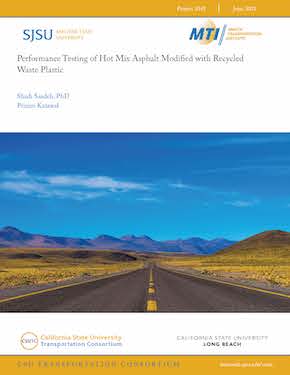- 408-924-7560
- mineta-institute@sjsu.edu
- Donate
Performance Testing of Hot Mix Asphalt Modified with Recycled Waste Plastic
Plastic pollution has become one of the major concerns in the world. Plastic waste is not biodegradable, which makes it difficult to manage waste plastic pollution. Recycling and reusing waste plastic is an effective way to manage plastic pollution. Because of the huge quantity of waste plastic released into the world, industries requiring a large amount of material, like the pavement industry, can reuse some of this mammoth volume of waste plastics. Similarly, the use of reclaimed asphalt pavement (RAP) has also become common practice to ensure sustainability. The use of recycled waste plastics and RAP in HMA mix can save material costs and conserve many pavement industries’ resources. To successfully modify HMA with RAP and waste plastic, the modified HMA should exhibit similar or better performance compared to conventional HMA. In this study, recycled waste plastic, linear low-density polyethylene (LLDPE), and RAP were added to conventional HMA, separately and together. The mechanical properties of conventional and modified HMA were examined and compared. The fatigue cracking resistance was measured with the IDEAL Cracking (IDEAL CT) test, and the Hamburg Wheel Tracking (HWT) test was conducted to investigate the rutting resistance of compacted HMA samples. The IDEAL CT test results showed that the cracking resistance was similar across plastic modified HMA and conventional HMA containing virgin aggregates. However, when 20% RAP aggregates were used in the HMA mix, the fatigue cracking resistance was found to be significantly lower in plastic modified HMA compared to conventional HMA. The rutting resistance from the HWT test at 20,000 passes was found to be similar in all conventional and modified HMA.
SHADI SAADEH, PhD
Dr. Shadi Saadeh joined the CSULB Civil Engineering and Construction Engineering Management Department in 2007. Dr. Saadeh worked for the Texas Transportation Institute (TTI) from 2003-2005 and the Louisiana Transportation Research Center (LTRC) from 2006- 2007. He received his BSc in civil engineering from the University of Jordan (1997), MSc in Civil Engineering from Washington State University (2002), and PhD in Civil Engineering from Texas A & M University (2005).
Dr. Saadeh’s research focuses on granular materials, including asphalt mixes and its constituents. His main areas of research are experimental characterization of highway materials, constitutive modeling of highway materials at the microstructural level, performance evaluation of highway infrastructure, flexible pavement design and analysis, and experimental characterization of highway materials using X-ray computed tomography (CT), image analysis techniques, and mechanical testing.
Dr. Saadeh has authored research papers in high-quality engineering and scientific journals such as Journal of Transportation Research Board (TRB), American Society for Testing and Materials (ASTM), Journal of the American Society for Civil Engineers (ASCE), Journal of the Association of Asphalt Paving Technologists (AAPT), and Journal of Computational Materials Science.
PRITAM KATAWAL
Pritam is currently a student of Master’s in Civil Engineering at California State University Long Beach. He holds a Bachelor’s Degree in Civil Engineering from Tribhuvan University, Nepal. His interests include pavement design, transportation geometric design, and transportation planning.
-
Contact Us
San José State University One Washington Square, San Jose, CA 95192 Phone: 408-924-7560 Email: mineta-institute@sjsu.edu






